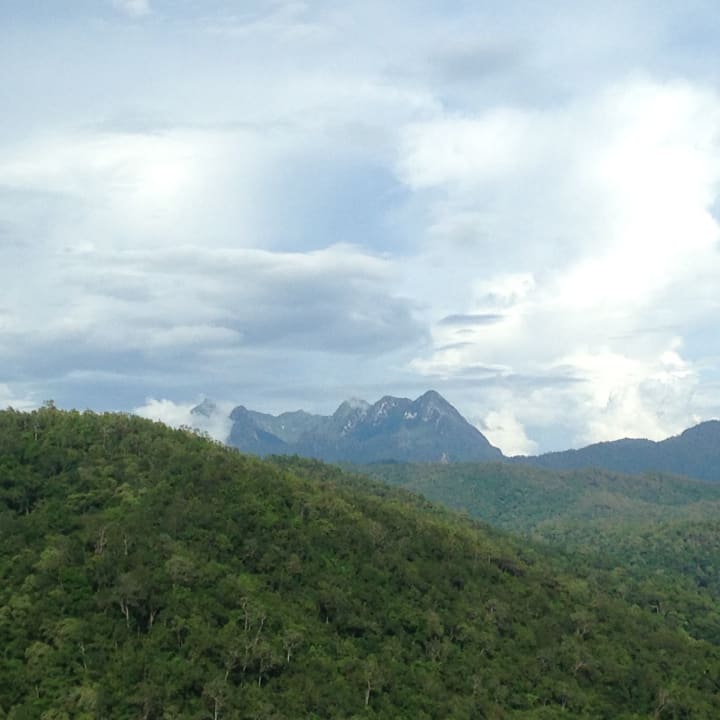
It’s so hot, I can feel my face is reddening in the worst way. I was way too ambitious in taking on this path. Riding my bike everyday was no preparation for this. Removing the roots of a tree from the ground with a machete was no preparation for this, nothing really could have prepared me for such a hike.
My foot, laced into my beautifully muddied hiking boot from REI, slips in wet leaves and my fist is clamped around mud as I crawl up further into the jungle of a Thai mountain, the path quite far below me now. In front of me, a pair of feet clad in plastic flip-flops are effortlessly floating from one muddy step to the next.
The feet belong to Eddy, a mahout who starts every day walking up this mountain to locate his semi-wild elephant. He stops and points to an area where trees have bent, a large muddy depression is in the ground. He tells me that his elephant made that depression. There are three elephants that share this property, but he knows exactly who made that mark. He seems proud of the crater his elephant created and effortlessly continues up the mountain, not a dot of sweat on his brow.

Thai Jungle and Mountains
I’m a behavioral ecologist, an animal scientist and enthusiast, and a white person from the USA who was raised on Western ideals: Our dogs have more rights than many non-white people. Our air conditioners are our best friends. A chain is bad, but a leash is O.K, and eating guinea pigs is not something we would ever do, but rabbit is fine.
Western ideals are, unfortunately, being enforced on many far off locations all because of one big complex and confusing industry: Tourism (and eco-tourism).
When a country like, say, Thailand, relies on the tourism industry for income, they are forced to bend their culture to adhere to that of westernized comfort in order to please the tourists.
In one area of tourism, this is becoming worrisome, and if the title is any hint, that area is elephant tourism, the moneymaker of the mahouts in many South Asian countries and communities.
Just recently, the Jane Goodall Institute page on Facebook posted an article roasting mahouts for animal abuse. These articles are commonly shared and many are able to read and respond to them, but not the mahouts, who speak Thai and can’t defend against these English accusations. For the 193,645 people who follow the Jane Goodall Institute Facebook page and now have access to that article, I wonder how many have had access to an actual mahout, as I did when I was in Thailand.
“You were four years old when you met?” I’m in awe, watching Eddy gently run his hand along the elephant's side, nodding. They called him elephant boy, when this elephant came to his village and they began to bond many years ago.
He’s been the only mahout this elephant has ever had, and they’ve been a pair for 20 years. The elephant, overjoyed, pees. Eddy jokes about it being a waterfall, and then tells me it’s because the elephant is happy to see him. Eddy takes the chain that his elephant, who’s name is in Thai characters but is pronounced Pu Noy (Poon-Oy), wears and puts it over his neck. It’s the equivalent of Eddy having me wear an empty fanny pack on my back.
Though many Westerners see chains and think torture, Pu Noy’s chain allows him to be semi-wild. True wilderness is what the Western tourists want to see, the idea of happy, wild and cute elephants, but it’s not an option for Pu Noy.
Pu Noy is one of Thailand’s many domesticated elephants, descendants of a long line going back to the first armies and kings of the area. These elephants are like dogs in the sense that they don’t fear humans at all, and they haven’t for centuries. Should Pu Noy be set free, he would come back to human villages and feast on farmland, devastating small farmers and endangering human lives.
Even if he wasn’t a domesticated elephant, the resources left for wild elephants in Thailand have been depleted to the point where he would not have anywhere to go. Habitat depletion is causing wild elephant populations to struggle while tourism keeps domestic populations of elephants afloat. Before tourism, elephants were used for logging, but when the logging industry was banned, many families were unable to care for their elephants and had to sell them.
In the best-case scenario, elephant camps would buy these elephants for tourists to interact with. Now, mahouts entirely rely on tourism to feed and care for these elephants, but with Western idealism threatening elephant tourism, the thousands of elephants belonging to mahouts are in trouble.
We walk with Pu Noy down to a river, and he seems to know exactly what is about to happen. This is his job, his work, and how he earns the tourism money that Eddy uses to keep him semi-wild and happy.
Scientifically speaking, we can’t say that Pu Noy knows he is working, and we can’t say he is happy to do so. Still, I can say that he broke into a trot when we got to the river, hurrying to the bucket of pumpkins and watermelons we had left there. We fed, bathed and pet the elephant, taking photos and offering him all of our pumpkins. Afterwards, we watched as the two other mahouts joined with their elephants, one pregnant with Pu Noy’s calf.
They all had their watermelons and pumpkins, and then they wandered into the river before the mahouts set them out to roam on their own in the jungle again. His work for the next two weeks is done. Every day, twice a day, these mahouts will hike the jungle to find their respective elephants, and make sure they are healthy and happy, and provide them with any necessary care. Eddy knows his elephant better than most, allowing him to find Pu Noy quickly even though that elephant goes up farther and higher than the other elephants on the property.
Should tourists refuse to come to areas where elephants wear chains or are trained with a tool designed to prod their ears, good mahouts will no longer be able to control domestic elephants safely around tourists, and domestic elephants won’t be able to safely roam jungles the way Pu Noy now can.
Mahouts are considered abusive as Western tourists won’t take the time to understand the necessary tools for working with such large mammals that allow them to safely coexist in the only way they can, with the people who have kept them for generations.
And what about the controversy of riding elephants? Well, elephant tourism has suffered a blow from ‘no ride’ sanctuaries, popping up to catch vegan-minded tourists, however, ‘no ride’ does not always mean ‘good mahout.’
A better rule of thumb is ‘no saddle’, as the saddles are not good for elephant’s backs and often allow for them to be overworked. I watched Eddy climb onto Pu Noy’s back and ride his neck while bathing him. While Pu Noy hardly felt any added weight, Eddy was able to closely examine and interact with his elephant, something that helps ensure that anything that might go wrong with Pu Noy’s health could be quickly detected.
So while there are many controversies surrounding any use of an animal as majestic and empathy-inspiring as an elephant, remember that unless a mahout is a part of the conversation, then you may be wasting time and thought while applying Western ideals to a culture that they don’t apply to, and your protests of mahout tourism puts both the elephants and the mahouts that consider them family in jeopardy.

Pu Noy bathes on his own, free to do as he pleases after a hard day's work of eating pumpkins
About the Creator
Phin A
Animal Behavior Scientist and Artist, works in Sculpture, Digital media, Water media, Drawing, Painting and Photo.






Comments
There are no comments for this story
Be the first to respond and start the conversation.